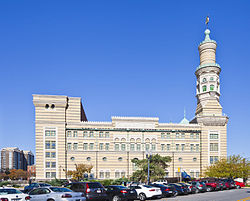Old National Centre
| Murat Shrine | |
 |
|
| Address | 502 N. New Jersey St. Indianapolis, Indiana United States |
|---|---|
| Coordinates | 39°46′27″N 86°9′4″W / 39.77417°N 86.15111°WCoordinates: 39°46′27″N 86°9′4″W / 39.77417°N 86.15111°W |
| Owner | Murat Shriners of the Ancient Arabic Order of the Nobles of the Mystic Shrine |
| Operator | House of Blues |
| Capacity | 2,600 (Murat Theatre) 1,800 (Egyptian Room) 600 (Corinthian Hall) |
| Current use | music venue |
| Construction | |
| Opened | 1909 |
| Architect | Oscar D. Bohlen |
| Website | |
| oldnationalcentre |
|
The Murat Shrine, now officially known as Old National Centre and originally known as the Murat Temple and Murat Centre, is an entertainment venue in Indianapolis, Indiana, owned by the Murat Shriners of the Ancient Arabic Order of the Nobles of the Mystic Shrine. It is the oldest stage house in downtown Indianapolis that is still standing, the only Shrine temple in the world with a French-originating name, and the largest Shrine temple in North America.
In 1882, five Freemasons decided they wished to see a Shrine organization in Indianapolis. They joined the Shrine Temple at Cincinnati, Ohio, and had that temple's help in establishing an Indianapolis temple. The local organization of the Shrine, called the Indianapolis Shriners, was given its charter on June 4, 1884. The first potentate was John T. Brush, who served as such from 1884 to 1897. Lew Wallace and Thomas Taggart were among their first Ceremonial Class, held in 1885. By the end of the first year, there were 105 members. The Indianapolis Valley of Scottish Rite gave them the Townsley and Wiggans "Pork House" for their meetings.
The Murat Temple was built in 1909 by the William P. Jungclaus Company using the designs of Murat Shriner Oscar D. Bohlen, with Middle Eastern and Egyptian stylings that were fitting for a building intended for Shriners. Its namesake is the Nubian Desert oasis Bir Murat, which was named for the Frenchman Joachim Murat, who was one of Napoleon's generals in his Egyptian campaign.
...
Wikipedia
